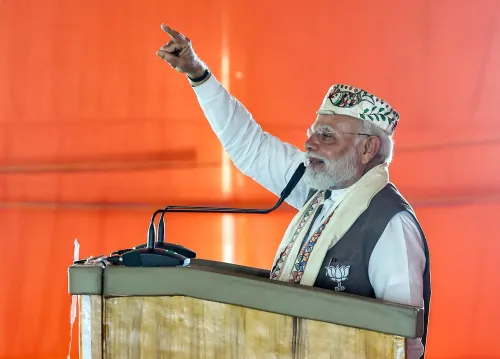Auto Parts Suppliers Race to Tackle New US Tariffs

Synopsis
Key Takeaways
- US tariffs on auto parts are set to begin on May 3.
- South Korean suppliers are assessing production increases in the US.
- Hyundai Motor Group is freezing vehicle prices to ease consumer concerns.
- Smaller suppliers may struggle to survive without price increases.
- The South Korean government is injecting funds into the automotive sector.
Seoul, April 11 (NationPress) South Korean auto parts suppliers are in a rush to address the newly implemented US tariffs on imported vehicles and automotive components, as reported by industry insiders on Friday. They claim that these tariffs not only represent a significant hurdle for automakers, particularly the local giant Hyundai Motor Group, but also risk disrupting the entire industry supply chain.
The administration of Donald Trump initiated a 25 percent tariff on imported vehicles last week and plans to apply the same rate to auto parts starting May 3, a decision that has thrown production planning and investment strategies into disarray across the sector, according to Yonhap news agency.
While the spotlight has largely been on finished vehicle exports, South Korean parts suppliers are facing increasing uncertainties and risks, as indicated by industry officials.
"We are currently assessing the potential for boosting production at our facility in Alabama," mentioned a manager from a company located in Siheung, Gyeonggi Province, who preferred to remain anonymous. "An internal task force has been established to explore practical responses, and we are in ongoing discussions with Hyundai Motor Group to align our strategies."
The manager highlighted that their products contribute to the production of approximately 320,000 engines annually for Hyundai Motor Group's vehicles in the US.
"We are not maintaining overly optimistic expectations that the auto tariffs will be withdrawn. Instead, we are bracing for the worst," stated the official. "Automakers will not be able to absorb all the costs associated with the tariffs, so we are also evaluating our own strategies."
Although Hyundai Motor Group may possess the financial means to temporarily manage tariff-related expenses, suppliers worry that many smaller companies may not survive without raising prices, which would ultimately erode their competitiveness in the US market, potentially leading to declines in both sales and profitability.
Hyundai Motor Co. announced last week that it will maintain the prices of all new vehicles sold in the US until early June, a strategy aimed at alleviating consumer concerns over rising expenses due to the new tariffs.
Another supplier based in North Gyeongsang Province shared similar apprehensions.
"There is no clear solution apart from increasing local production in the US, but that is not a quick fix. Labor and operational costs are significantly higher there," indicated an official from the parts manufacturer, who also requested anonymity.
This company operates a plant in Savannah, Georgia, and currently divides its US supplies evenly between shipments from Korea and local production. Their components are utilized in the manufacturing of around 2.8 million Hyundai and Kia vehicles each year.
"Auto manufacturers and suppliers are still evaluating the situation," she added. "For now, we are maintaining our current operations and waiting to see if the US government might announce a grace period or a reversal before the May 3 deadline."
The uncertainty is further exacerbated by the unpredictable nature of US trade policy.
This week, the South Korean Ministry of Trade, Industry and Energy declared it would inject an additional 2 trillion won (approximately $1.35 billion) into the local automotive sector, which is facing challenges from US tariffs on car imports. Automobiles constitute South Korea's top export category to the US.
Last year, South Korea's automobile exports to the US reached $34.7 billion, representing nearly half of the nation’s total auto exports. In 2024, the country exported $8.2 billion worth of auto parts.
—IANS









